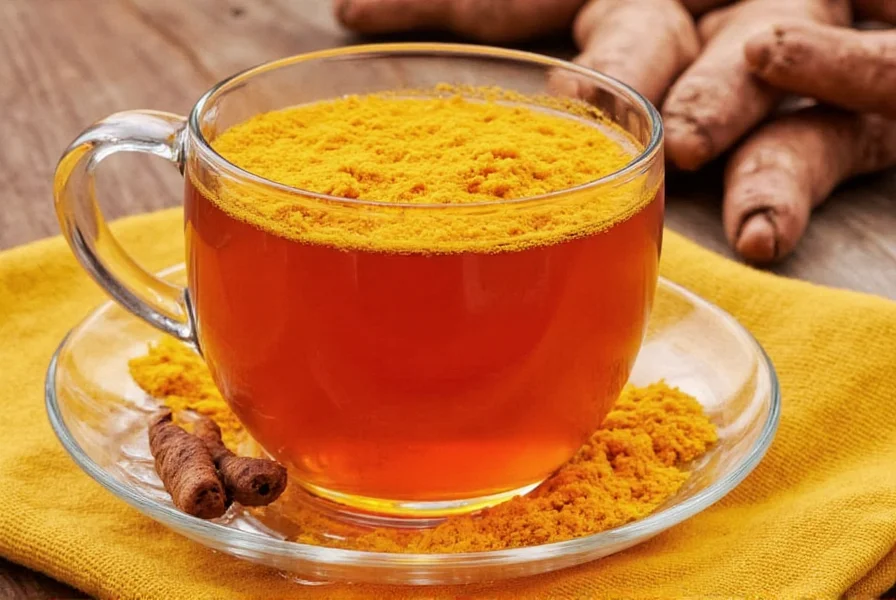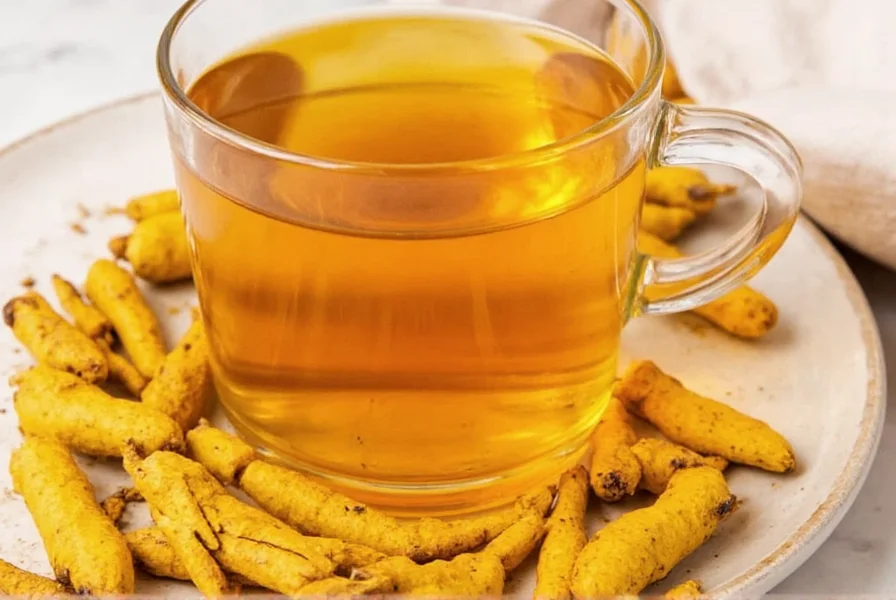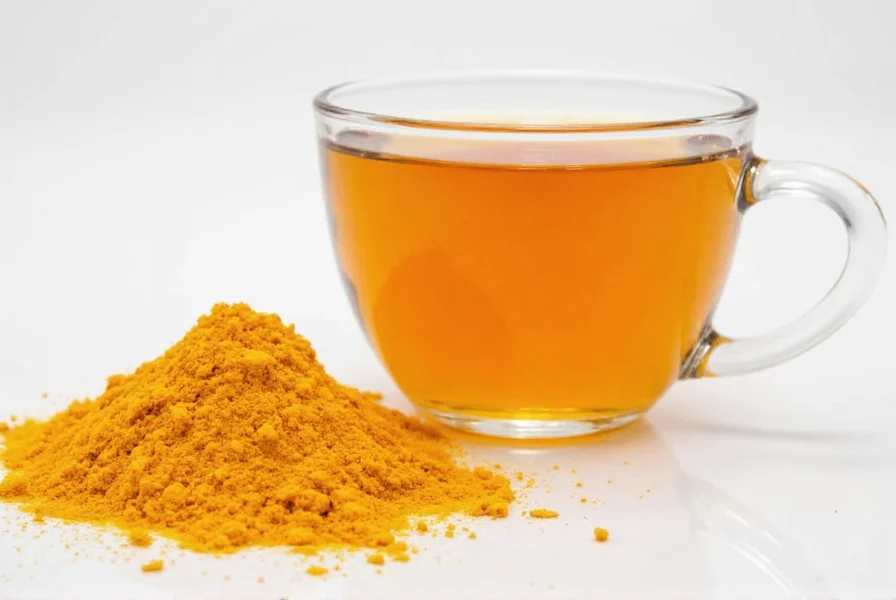Turmeric tea, sometimes called golden milk tea when prepared with dairy or plant-based milk, has gained popularity as a functional beverage with potential health-promoting properties. The active compound curcumin, responsible for turmeric's vibrant yellow color, demonstrates bioactive effects in scientific studies, though its low natural bioavailability requires strategic preparation for optimal absorption.
The Science Behind Turmeric Tea Benefits
Curcumin, turmeric's primary bioactive compound, shows promise in research for supporting the body's natural inflammatory response. A 2022 meta-analysis published in Nutrients reviewed 22 clinical trials and found that curcumin supplementation demonstrated statistically significant reductions in inflammatory markers compared to placebo. However, the researchers noted that bioavailability remains a critical factor—curcumin alone has poor absorption, which is why traditional preparations include black pepper (containing piperine) and healthy fats.
When preparing turmeric tea for maximum benefit, consider these evidence-based factors:
| Preparation Factor | Scientific Rationale | Recommended Approach |
|---|---|---|
| Fat inclusion | Curcumin is fat-soluble | Add 1-2 tsp coconut oil or full-fat milk |
| Black pepper | Piperine increases absorption by 2000% | ¼ tsp freshly ground black pepper |
| Heating | Enhances solubility | Brew 10-15 minutes at 160-180°F (70-82°C) |
| Turmeric form | Fresh root contains more volatile oils | 1 tbsp grated fresh root or 1 tsp powder |
How to Make Turmeric Tea at Home: A Science-Optimized Recipe
Creating effective anti-inflammatory turmeric tea requires more than just steeping powder in water. This evidence-based preparation method maximizes potential benefits:
- Simmer 2 cups of water (do not boil) to 160-180°F (70-82°C)
- Add 1 tbsp freshly grated turmeric root or 1 tsp high-quality turmeric powder
- Include ¼ tsp freshly ground black pepper
- Add 1-2 tsp coconut oil or MCT oil
- Simmer gently for 10-15 minutes
- Strain and add optional ingredients: ½ tsp grated ginger, lemon juice, or honey

This preparation method addresses the curcumin absorption challenges documented in pharmacological research. The combination of heat, fat, and piperine from black pepper creates what researchers call a "bioavailability enhancer system" that significantly increases the amount of curcumin your body can utilize.
Turmeric Tea vs. Other Consumption Methods
While how to make turmeric tea for inflammation is a common search query, it's worth comparing this method to other approaches:
- Capsules/supplements: Often contain standardized curcumin extracts with added piperine or phospholipids for better absorption, but lack the ritual and additional compounds from whole turmeric
- Fresh turmeric in food: Provides dietary context with other beneficial compounds but may not deliver concentrated doses
- Turmeric tea: Offers moderate curcumin levels with the added benefits of hydration, warmth, and potential synergistic effects from complementary ingredients like ginger
A 2021 study in Food Science & Nutrition found that traditional preparation methods like tea actually preserved more of turmeric's volatile compounds compared to high-heat cooking methods, suggesting potential advantages to the tea preparation approach.
Important Considerations and Potential Side Effects
While many seek information about the best time to drink turmeric tea, it's crucial to understand potential interactions and limitations:
- Medication interactions: Turmeric may enhance blood-thinning medications' effects—consult your healthcare provider if taking anticoagulants
- Gastrointestinal sensitivity: High doses may cause stomach upset in some individuals
- Iron absorption: Curcumin may interfere with iron absorption—those with iron deficiency should consume turmeric tea between meals
- Pregnancy considerations: While culinary amounts are generally safe, therapeutic doses should be discussed with a healthcare provider
The National Center for Complementary and Integrative Health notes that while turmeric is generally safe as a food ingredient, therapeutic use of turmeric tea for specific health conditions should be approached with medical guidance, particularly for those with gallbladder issues or taking certain medications.

Evidence-Based Expectations for Turmeric Tea Benefits
It's important to maintain realistic expectations about what turmeric tea can actually do. While promising, research shows:
- Effects are generally modest and build over consistent, long-term use
- Most studies use concentrated curcumin extracts (500-2,000mg), not tea preparations
- Individual responses vary significantly based on genetics and health status
- Turmeric tea works best as part of an overall healthy lifestyle, not as a standalone solution
A 2023 systematic review in Phytotherapy Research concluded that while curcumin shows potential for supporting joint health and inflammatory balance, "the translation of these effects to culinary preparations like turmeric tea requires further investigation." This highlights the importance of understanding that homemade turmeric tea benefits may differ from those seen in clinical studies using standardized extracts.
Frequently Asked Questions
What are the main health benefits of drinking turmeric tea daily?
Regular consumption of properly prepared turmeric tea may support the body's natural inflammatory response, provide antioxidant protection, and potentially aid digestion. Research suggests benefits build over consistent use, with most studies showing effects after several weeks of daily consumption. The addition of black pepper and healthy fats significantly enhances these potential benefits by improving curcumin absorption.
How much turmeric tea should I drink per day for optimal benefits?
Most research on curcumin benefits uses doses equivalent to 500-2,000mg of curcumin daily. A typical cup of properly prepared turmeric tea contains approximately 100-200mg of curcumin. For potential health benefits without excessive intake, 1-2 cups daily is generally considered appropriate. Those with specific health concerns should consult a healthcare provider for personalized guidance.
Can turmeric tea help with arthritis or joint pain?
Some studies suggest curcumin may help support joint health and comfort. A 2020 review in the Journal of Medicinal Food found that curcumin supplementation showed promise for supporting joint function, though most research used concentrated extracts rather than tea preparations. While turmeric tea may provide some benefits, it likely offers more modest effects than therapeutic-dose supplements. Consistent daily consumption as part of an overall healthy lifestyle appears most beneficial.
When is the best time to drink turmeric tea for maximum absorption?
For optimal absorption, consume turmeric tea with or shortly after a meal containing healthy fats. The presence of dietary fat enhances curcumin absorption, while black pepper (piperine) in the tea further increases bioavailability. Many people find evening consumption beneficial due to turmeric's potential support for relaxation and overnight recovery processes, but the timing matters less than consistent daily consumption with proper preparation.
How long does it take to notice benefits from drinking turmeric tea?
Most research on curcumin's effects shows measurable changes after 4-8 weeks of consistent daily consumption. Individual responses vary based on health status, preparation method, and genetic factors affecting metabolism. Some people report noticing subtle changes in joint comfort or energy levels within 2-3 weeks, while more significant effects typically require longer consistent use. Patience and regular consumption are key for experiencing potential benefits.











 浙公网安备
33010002000092号
浙公网安备
33010002000092号 浙B2-20120091-4
浙B2-20120091-4